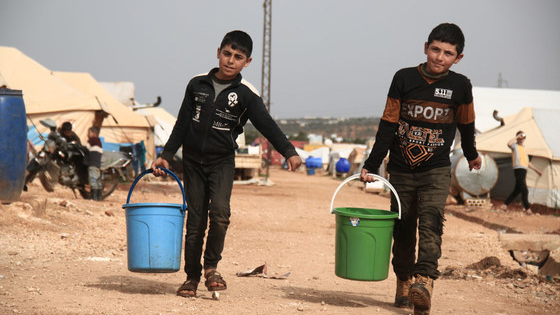
Children fetching water at a refugee camp. (File photo:UNICEF)
The World Health Organization and the United Nations children's fund (UNICEF) have warned that a surge in measles cases in January and February 2022 is a worrying sign of a heightened risk for the spread of vaccine-preventable diseases and could trigger larger outbreaks, particularly of measles affecting millions of children this year.
Pandemic-related disruptions, increasing inequalities in access to vaccines, and the diversion of resources from routine immunization are leaving too many children without protection against measles and other vaccine-preventable diseases.
The risk for large outbreaks has increased as communities relax social distancing practices and other preventive measures for COVID-19 implemented during the height of the pandemic. Additionally, with millions of people being displaced due to conflicts and crises including in Ukraine, Ethiopia, Somalia and Afghanistan, disruptions in routine immunization and COVID-19 vaccination services, lack of clean water and sanitation, and overcrowding increase the risk of vaccine-preventable disease outbreaks.
Nearly 17,338 measles cases were reported globally in January and February 2022, compared to 9,665 during the first two months of 2021. As measles is very contagious, cases tend to show up quickly when vaccination levels decline. The agencies are concerned that outbreaks of measles could also forewarn outbreaks of other diseases that do not spread as rapidly.
Apart from its direct effect on the body, which can be lethal, the measles virus also weakens the immune system and makes a child more vulnerable to other infectious diseases like pneumonia and diarrhoea, including for months after the measles infection itself among those who survive. Most cases occur in settings that have faced social and economic hardships due to COVID-19, conflict, or other crises, and have chronically weak health system infrastructure and insecurity.
"Measles is more than a dangerous and potentially deadly disease. It is also an early indication that there are gaps in our global immunization coverage, gaps vulnerable children cannot afford," said Catherine Russell, UNICEF Executive Director. "It is encouraging that people in many communities are beginning to feel protected enough from COVID-19 to return to more social activities. But doing so in places where children are not receiving routine vaccination creates the perfect storm for the spread of a disease like measles.”
In 2020, 23 million children missed out on basic childhood vaccines through routine health services, the highest number since 2009 and 3.7 million more than in 2019.


